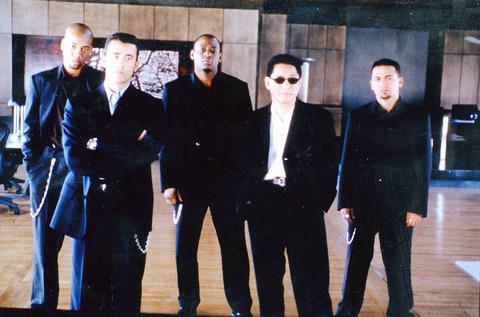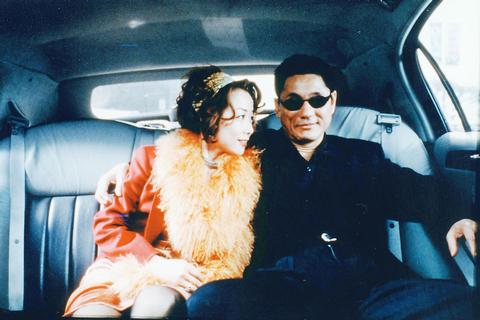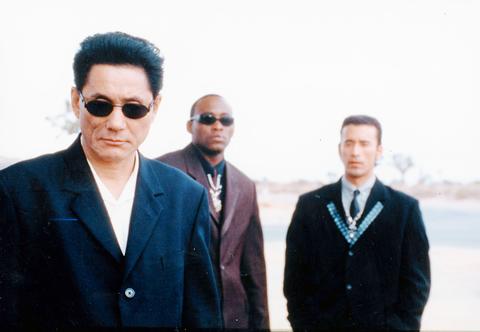Anyone familiar with Takeshi Kitano's movies will immediately recognize his latest film Brother. His slow steps, sunglasses, cocked head, simmering glance and deadpan face are classic. And when there is a close-up of his mug, with a barely visible muscle twitch, we know the next move will be sudden and severe violence, like sticking chopsticks into someone's eyes, crashing broken glasses across someone's neck, or shooting four people in three seconds.
In Brother, the international co-production with funds from Japan and Britain, Kitano intends to bring his aesthetic of violence out of Japan and into the US. He plays a Japanese yakuza hit man -- under his acting name Beat Takeshi -- named Yamamoto who faces off against African-American and Hispanic gangs, as well as Italian mafia in Los Angeles in a clash of Japanese yakuza culture and American gang culture.
Having made breakthrough films over the past 10 years, Kitano is not one for cheap action flicks. The atmosphere in this film seems to have recaptured the one in Hana-bi (Fireworks), the movie which won Kitano the Golden Lion for best feature film at the Venice Film Festival in 1998. It's again the world of a hero, with slow, clean-cut shots and a gentle jazz orchestral score by Joe Hisaishi.

PHOTO COURTESY OF SPRING INTERNATIONAL
Like Hana-bi, there is always a deep sadness in Kitano's brutal and cruel world. Yamamoto is bound by codes of honor, gangster brotherhood and real brotherhood, and his simple life philosophy that life is always shadowed by death. He is always ready to die, but before he dies he needs to kill his way out of situations to make sure he and his brothers live a bit longer. And when he dies, he wants to make sure everybody is taken care of.
Brother is more violent than Hana-bi, including as it does the severing of fingers and the slashing of a belly. There are also more fancy gang costumes, designed by Yohji Yamamoto. And as the title Brother suggests, women don't play a big part in the film, but then, women rarely do in Kitano's films. Kitano's is a man's world.
Yamamoto is forced to flee to Los Angeles because his gang is defeated in a gang war in Japan. A newcomer to LA, he finds his half brother/drug-pusher Ken (Claude Maki) and his friend Denny (Omar Epps). When Ken and his friends get into trouble, Yamamoto swiftly helps wipe out the competing drug dealers who took over his buddies' turf as he was so keen on doing back in Japan. "I'm at war in America, too," he says to his brother and Denny.

PHOTO COURTESY OF SPRING INTERNATIONAL
War makes Yamamoto feel alive and no longer a stranger in a strange land. The motley mob of gang members begins to call him Aniki, "brother" in Japanese, and they adopt yakuza rules and set up a new yakuza branch in LA and even begin to wear the typical yakuza wide-collared shirts, shiny suits and heavily-gelled hair. But, inevitably the LA yakuza is bound to face the Italian mob in an all-out turf war that can only go awry.
The film is largely in English mixed with some Japanese, which makes Kitano's handling of the language and cultural barriers a major aspect of the film. The film offers several typical scenes of traditional yakuza culture, such as the severing of fingers as self-punishment, harikiri to show loyalty and the unique brand of violence -- fast, cruel and mindless, but sharp, to-the-point and highly stylized.
Yamamoto plays the silent knight-errant, who merely observes others' stupidity until he erupts with some explosive killings or a cool line. His friendship with Denny brings out the motif of brotherhood among gangsters. The two develop genuine affection, though the sinister side of this is that they become chums while gambling to see who will pull the trigger to shoot a hostage.

PHOTO COURTESY OF SPRING INTERNATIONAL
Loyal Kitano fans, however, may be a bit dismayed by the persistent sadness of the story. Brother is also looser than his award-winning work and the violence is slightly too overblown and noisy for the audience to fully appreciate Kitano's style.

Late last month Philippines Foreign Affairs Secretary Theresa Lazaro told the Philippine Senate that the nation has sufficient funds to evacuate the nearly 170,000 Filipino residents in Taiwan, 84 percent of whom are migrant workers, in the event of war. Agencies have been exploring evacuation scenarios since early this year, she said. She also observed that since the Philippines has only limited ships, the government is consulting security agencies for alternatives. Filipinos are a distant third in overall migrant worker population. Indonesia has over 248,000 workers, followed by roughly 240,000 Vietnamese. It should be noted that there are another 170,000

Hannah Liao (廖宸萱) recalls the harassment she experienced on dating apps, an experience that left her frightened and disgusted. “I’ve tried some voice-based dating apps,” the 30-year-old says. “Right away, some guys would say things like, ‘Wanna talk dirty?’ or ‘Wanna suck my d**k?’” she says. Liao’s story is not unique. Ministry of Health and Welfare statistics show a more than 50 percent rise in sexual assault cases related to online encounters over the past five years. In 2023 alone, women comprised 7,698 of the 9,413 reported victims. Faced with a dating landscape that can feel more predatory than promising, many in

“This is one of those rare bits of TikTok fitness advice with a lot of truth behind it,” says Bethan Crouse, performance nutritionist at Loughborough University. “Sometimes it’s taken a bit too literally, though! You see people chugging protein drinks as they’re scanning out of their gym.” Crouse recommends the athletes she works with consume 20-30g of protein within 30-60 minutes of finishing a resistance training session. “The act of exercising our muscles increases the breakdown of muscle proteins,” she says. “In order to restore, or hopefully improve them — and get gains such as increased muscle mass or strength —

“Far from being a rock or island … it turns out that the best metaphor to describe the human body is ‘sponge.’ We’re permeable,” write Rick Smith and Bruce Lourie in their book Slow Death By Rubber Duck: The Secret Danger of Everyday Things. While the permeability of our cells is key to being alive, it also means we absorb more potentially harmful substances than we realize. Studies have found a number of chemical residues in human breast milk, urine and water systems. Many of them are endocrine disruptors, which can interfere with the body’s natural hormones. “They can mimic, block